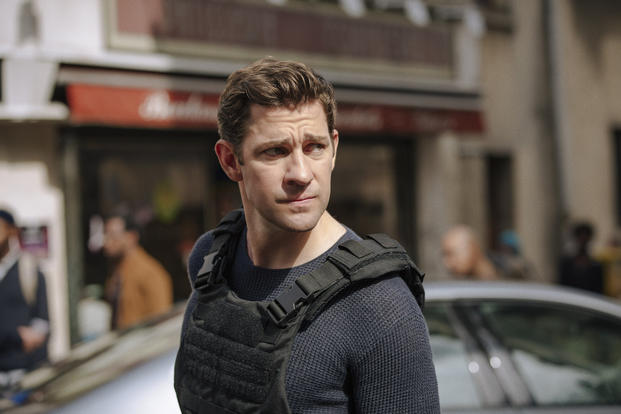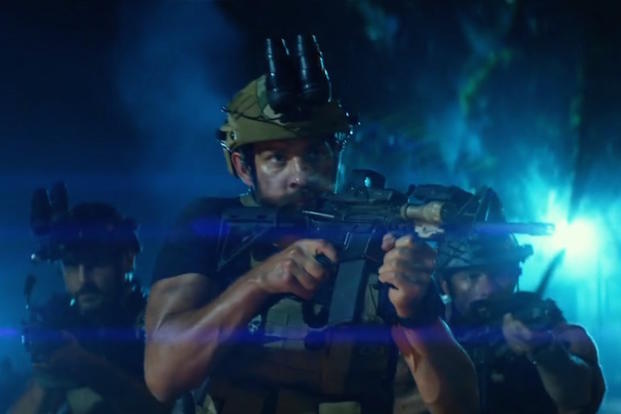Amazon Prime Video's new series "Tom Clancy's Jack Ryan" (debuting online on August 31st) takes an epic swing in reinventing Clancy's spy novels for a new generation. Most of the previous movies were heavily diluted version of Clancy's dense novels, but this new version jettisons the original plots but manages to create a Jack Ryan and a Jim Greer that feel far more connected to Clancy's original characters.
Hardcore Clancy fans are either going to buy into the heart and spirit of this version or get tripped up by the 21st century plot lines. Newcomers will see a series that hits all the expected notes from a spy tale but hits them all with confidence and flawless execution.
John Krasinki turns out to be a fantastic Jack Ryan. He draws on the cubicle-dwelling Jim from "The Office" and offers flashes of the operator Jack Silva he played in "13 Hours," perfectly walking the line between dork and badass. Wendell Pierce is the best Jim Greer ever, constantly grumbling at the bureaucrats and his underlings but turning on a time to lead in a crisis.
Marine Corps veteran Graham Roland runs the show in partnership with Carlton Cuse, who used to be Graham's boss when he was a writer on "Lost." Amazon likes season one's eight episodes so much that they've already committed to season two, which is currently filming in South America. Graham took some time out from production to fill us in on season one.
Can you tell us about your military service?
I enlisted in the Marine Corps in November of 2000 and did the of customary training, MOS school, bootcamp, School of Infantry, all of that stuff. Then I enrolled in college while I was serving in the reserves at SEAL Beach, 5th Battalion, 14th Marine. I was an Elite 61 forward observer. I was called up in 2005 and I served in Iraq from September 2005 to April 2006. I got out as a sergeant.
There's a pretty quick turnaround from getting out of the Corps and getting your job writing on "Lost." How do you pull that off?
Yeah, it happened fast. My service really helped in that regard because the pilot script that got me hired on "Lost," and also got me my first job on "Prison Break" the year before that, was based on my experience in Iraq. It was a supernatural genre pilot with a mystical plot. It was about a platoon of Marines stationed in Iraq at what they come to find out was the site of the Garden of Eden.
That script was out there and it was sort of "Lost"-ian, but it definitely had all the details that I think you look for when you're looking for writing. It just felt real, so it was a great sample. That helped me get my foot in the door.

Were you studying writing while you were in school? Was this something you fell into or were into all along?
From age 11 or so, I was writing stories. Part of my inspiration for going into the Marine Corps, because it was prior to 9/11, and I was, A, looking for money for school, but B, knowing that I wanted to write, I really wanted something to write about. I wanted an experience and that was a big motivating factor of why I chose the Marines, why I enlisted at all. It definitely paid dividends.
I enrolled in film school at Cal State Fullerton and I was using the GI Bill to pay for school. I took all the required film classes. In addition to that, I was taking all of the creative writing classes in the English department.
How do you get hooked up with Carlton Cuse and Michael Bay and John Krasinski to do this daring reimagining of the Jack Ryan character?
Michael Bay's Platinum Dunes was involved early. They were involved because Paramount owned the Jack Ryan franchise. Platinum Dunes had a big deal at Paramount. Because of the work Michael Bay had done prior to that on shows like The Last Ship, Paramount approached them asked if they wanted to get involved with this project.
Platinum Dunes knew it's a great franchise, but realized that they needed to go find writers. They started hearing pitches and takes on what a reboot of Jack Ryan could look like. That's how I met Platinum Dunes. We went into Paramount together and then Paramount liked my take. The studio had been seeing and talking to other writers and one of the writers they had been talking to simultaneously with me was Carlton Cuse. He had hired me on "Lost," and I had worked with him on this show for A&E called "The Return."
As soon as I heard his name, I knew we had to do this together. Carlton was a massive Clancy fan and we both said we want to do this. Paramount wanted us to do it. And that was it.

I've seen a few episodes at this point. What's impressed me so far is that the plot has the least to do with the novels and yet the character to me is the most true version of Jack Ryan that's ever been in a movie or show. Does that make sense?
Thank you so much. Obviously, John Krasinksi has a lot to do with that, because he did a great job. It's interesting that you say that. When Carlton and I agreed to do it, we weren't looking to reference the movies so much as we had both been fans of the books. We wanted to do something that felt more novelistic.
That's why we came up with the idea of having all these other stories exist in Jack's orbit and connect with his along the way, similar to what Clancy did in his books. We based our character more on what we felt like we read in "Red October" and "Clear and Present Danger." We didn't really draw from previous portrayals because there had been so many actors who had done it before. We just tried to honor what Clancy did with the character and then find the guy who we feel embodies that.

Robert Redford in "Three Days of the Condor" seems to have started the myth of the CIA analyst as secret badass. Clancy's character always seemed like a continuation of that fantasy, that the desk guys were the equal of any operative in the field. Your Jack Ryan has to learn to kick ass but there's still an element of dorkiness to his character.
That was definitely something that we wanted. One of the reasons that we liked John was because, at that time, he was most notable for his role on "The Office," which was kind of this goofy, lovable guy who worked in a cubicle. We loved that because that's how we wanted people to see Jack at first before watching him go through this progression as he becomes the action hero.
At the same time that we were looking for our Jack Ryan, we happened to get a sneak preview of Michael Bay's movie "13 Hours." John had totally transformed his body and really played this convincing action star. We thought that Jack Ryan lives somewhere in-between those two performances. It was such a rare thing to find a guy who could do both.

He's so kickass in "13 Hours," but then you dial him back for Jack Ryan. The way he plays Jack Silva in "13 Hours" is closer to the way other people have played Jack Ryan before.
From the conversations that we had with him, I think John immediately understood what the character was and what the sweet spot was. We're all pretty much in tune with what.

You also wrote the original screenplay that turned into "Mile 22." That's a movie about the real operators connected to the CIA. Did that story come from your work on this or is it something you developed separately?
I actually wrote and sold "Mile 22" before we sold Jack Ryan. Movies take a long time to get made.I think Peter Berg, the director, made two movies between the time I sold it and when he made "Mile 22". Peter always told me that he was passionate about this and was going to get this movie made. And he lived up to his word.
What kind of connections do the analysts and the operators have in the real-life CIA?
There is obviously some overlap in terms of the worlds, but that wasn't intentional. I saw the movie last week at the premiere. I have the "story by" credit, but Peter Berg and the screenwriter Lea Carpenter did a fantastic job and elevated the script that I originally sold. When you see it, it's a very different film and a very different story from Jack Ryan, but I'm proud of the job that they did.

Jack Ryan is this fictional creation of Tom Clancy. Are there analysts in the CIA who would find themselves in this position and transformed into kickass Jack Ryan operatives?
That's a good question and I have two answers for that. First, we had a consultant, who is still our consultant on Jack Ryan, who served as a captain in the Army. We just found him fortuitously and had never consulted on anything before.
He had served in Iraq, like I had. He later went to work on Wall Street and then, when he didn't find that fulfilling, he became a CIA Analyst. His trajectory is the exact trajectory of Jack Ryan, almost, with the exception of Army versus Marine Corps. That's an example of someone who kind of fits that mold in a weird way.
We learned that in the 90's, and prior to that, there was very little overlap between someone who was an analyst and someone who was like a police officer and what you would consider an operator. They were very segregated. The analysts thought the ops guys were knuckle-draggers and the ops guys thought the analysts were nerds.
Post-9/11, in the interest of shaking up the structure of the CIA, these separate jobs very much have been blended together. There's a lot more communication between analysts and case officers. And more analysts are getting sent into these dangerous places as opposed to doing the work from Langley.

Amazon has already ordered season 2, right?
Yeah, we're actually in week six of filming. Season one is an original story that takes place in the Middle East. Season two, much like the Clancy novel, still has Jack Ryan and James Greer, but they're on a new mission, and this one takes place in South America. So we're down filming it in Colombia right now.
Does the fact that all your episodes drop at the same time on Amazon Prime affect the way you structure your stories or do you just film the way you would if you're doing a weekly series? Do you even think about it?
Whether you want somebody to come back and watch next week or you want them to click over to the next episode, you still want to leave them hanging. You want to make them have to know what happens next. So that's not too different from doing a traditional show. When Amazon or another streaming service drops all the episodes at once, it feels like each episode is a chapter of a book. It felt like you be less concerned with wrapping everything up at the end of an episode. We could carry the stories and stretch them out so that they came to a head episodes down the line or at the end of a season. So it freed us up in that way.
You're making a story in South America next season. Are you thinking about Eastern Europe and Russia for future plots?
We are. Here's what I will say about season three: The honest answer is neither of us really have planned anything hard and fast on what's going to happen on season three from a setting perspective. We have some ideas for the character of Jack and the character of Greer and where they go, but the good thing about a show like this is there's no shortage of inspiration with everything that goes on in the world.
One of the things that we don't want to do is get too ahead of what's happening or try to predict what's gonna happen when we can wait and we can let the headlines tell us like what the next setting should be.

Here's another interesting thing that's hard to process. When Clancy was first writing these novels, the Soviet Union is falling apart and it's a high point for American intelligence culture. We seem to be living through an era where the whole idea of whether our operatives know what they're doing or whether the institutions that are here to protect our country are worthy of anybody's respect. Has that been in your minds when you're making the show?
No, it hasn't. I'm glad you asked that question. When we started making season one, it was almost three-and-a-half years ago, so it was a very different country even though it was such a recent time. Obama was president and things were just very different.
One of the traditions of the Clancy novels and one of the things that I've found being in the military and one of the things that I found with a lot of people who work in the CIA right now or have worked in the CIA in the past, is that there is a high level of competence among these people that are doing these jobs.
I'm not speaking to the upper level, I'm not speaking to the guys on the seventh floor of the CIA as much as I'm talking about the people like Jack Ryan in our stories: the analysts and the case officers. They're well-intentioned, they're making a great sacrifice to do this work because nobody is getting rich in this job. Much like people who join the military, for the most part they're very patriotic and they want to do right by their country and they want to protect their country. That, to us, that is the version of the CIA and the U.S. military that we want to project.





